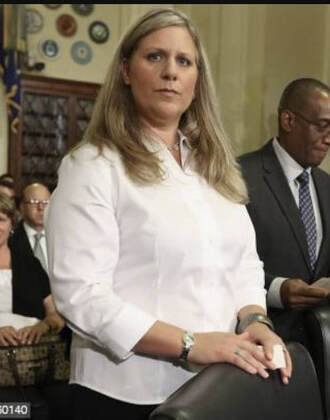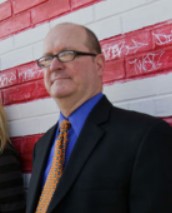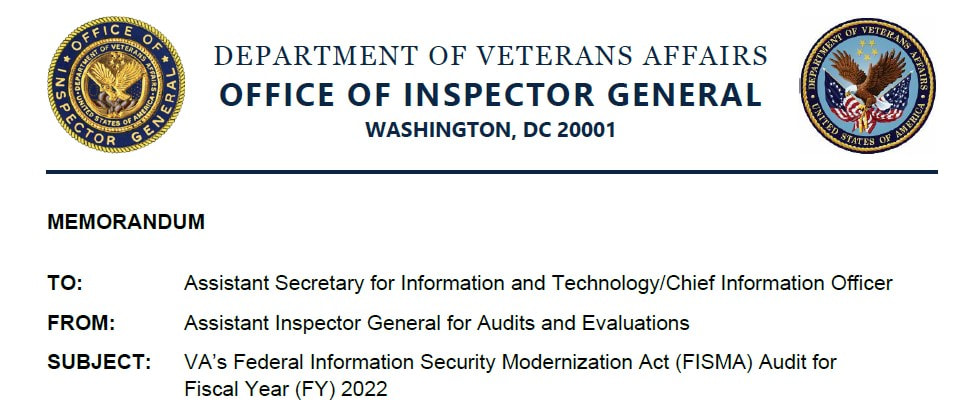About our guest Kristen Ruell
|
Kristen Ruell has worked at the department of Veterans Affairs for 15 years in Veterans Benefits Administration VBA. Currently she is a Program Analyst where she and her team spread the word about available VA benefits. After blowing the whistle at the department of Veterans Affairs, she was informed that her confidential whistleblower communications and her personal information is being stored in a VA system of records that is not secure and the information is readily available to the people she reported as a whistleblower. She is here today to bring awareness to other whistleblowers.
Related to today's topic:
More shows with Kristen: Feb 14, 2016 "Philly VA Update" with Kristen Ruell Oct 4, 2015 "Musical Chairs at the VA" with Kristen Ruell Aug 9, 2015 "More Craziness in Philly" with Kristen Ruell & Ken Crandall May 10, 2015 “Philly VA Whistleblower Update" with Kristen Ruell & Friends May 3, 2015 "Whistleblower Power at the Philly VA" with Kristen Ruell and Ryan Cease |
About our guest Benjamin Krause
|
Benjamin Krause, a prominent veterans rights attorney and journalist, is the founder of DisabledVeterans.org, dedicated to training veterans to secure their benefits. An esteemed authority on military veteran policy, his contributions have been featured in prominent publications like Newsweek and Bloomberg TV, and he's provided testimony to Congress on veterans' retraining issues. A proud disabled US Air Force veteran, Benjamin utilized the Chapter 31 Veteran Readiness & Employment benefits to graduate magna cum laude from the University of Minnesota Law School. He now leads Krause Law, PLLC, a firm committed to staunchly representing veterans in diverse legal matters nationwide. |
Click to read Ken's article detailing the issue of privacy rights abuses by the VA
About our guest Ken Crandall
|
Ken Crandall has a law degree from Temple University and worked at the VA for three years before being illegally fired twice after he whistleblew about mail shredding, duplicate payments, nepotism, and improper treatment of employees. He is a Navy Veteran and plans to spend the rest of his life fighting for the rights of whistleblowers.
Previous shows with Ken: |
About our guest Peter Rizzo and his whistleblower cases
Rizzo is no stranger to calling out corporate and governmental misbehavior. He worked for seven years for the U.S. Department of Veterans Affairs. During his tenure there, he and a colleague — James Metcalfe, Director of Western New York National Cemetery — were critical of the agency’s re-design of a busy intersection adjacent to the cemetery. Rizzo was removed from the project and Metcalfe was silenced as the ill conceived traffic design was implemented. Seven days after the intersection reopened to traffic, two Veterans were brutally killed there after leaving a funeral service for a friend and fellow Veteran.
VA cemetery managers who pushed safety changes before deadly crash claim retaliation ...
| va_cemetery_managers_who_pushed_safety_changes_before_deadly_crash_claim_retaliation.pdf |
Lawsuit: Developer selects sites to avoid Blacks
May 5, 2023 By Geoff Kelly
When the Clover Group — one of the region’s biggest real estate development and management firms — reviews potential building sites for senior citizen apartment complexes, it pays careful attention to what its executives call “the Canadian factor.”
When the firm’s executives talk about “Canadians,” however, they’re using a code — for Black people. And those executives know the company’s leadership isn’t interested in building housing where there’s a lot of them.
That’s according to a lawsuit filed today in federal court by a former Clover employee who recorded the company’s executives talking about its use of racial demographics to determine where they’ll invest — sometimes in coded language, sometimes explicitly.
The whistleblower said the company fired him after six months on the job when he objected to what he described as the company’s “racist and illegal practices.”
The lawsuit alleges that Clover Group companies and its executives:
“Rich’s Canadian factor was the thing I wasn’t sure he was going to be okay with,” said Robert Jack, a Clover vice president, during a Jan. 4 meeting with Rizzo and a second executive identified in the lawsuit as Russell Caplin, a land acquisition manager.
They were discussing a potential development site near East St. Louis, a city whose population is more than 96 percent Black. “Rich” refers to Richard Greenspan, vice president for operations at Clover, who has the final say on site selection, according to the lawsuit.
“There are a ton of Canadians — if I’m using the term correctly — immediately to the west in East St. Louis,” Caplin acknowledged.
Here Rizzo, the whistleblower, chimed in:
“What is it about the ‘Canadian factor’ that drives … our decisions and where we’re going? How does it affect our business?” Rizzo asked.
Jack responded: “Man, that’s an uncomfortable question. I don’t even know how to answer that, Peter. Rich likes to stay away from those areas. I don’t know. It’s … it’s an uncomfortable question. I don’t know.”
“Yeah,” Rizzo replied. “Have you ever asked the question?”
“Ask him that question, go ahead. You’ll get a colorful response,” Jack said. “He just doesn’t like what it does to the leasing.”
Jack assured Rizzo he did not share Greenspan’s objections to building in areas with what Greenspan considered a high percentage of Black people — any number over 20 percent, according to Rizzo. Another Clover employee who spoke to Investigative Post on condition of anonymity said the company’s unwritten limit was half that.
Jack said he hoped, as Clover expanded its development activities into Southern states, the company would “come around a corner on that” policy.
There followed a brief silence, broken by Caplin.
“Let’s just all hope we never get deposed on that,” he said.
(read the full story Lawsuit: Developer selects sites to avoid Blacks - Investigative Post : Investigative Post)
May 5, 2023 By Geoff Kelly
When the Clover Group — one of the region’s biggest real estate development and management firms — reviews potential building sites for senior citizen apartment complexes, it pays careful attention to what its executives call “the Canadian factor.”
When the firm’s executives talk about “Canadians,” however, they’re using a code — for Black people. And those executives know the company’s leadership isn’t interested in building housing where there’s a lot of them.
That’s according to a lawsuit filed today in federal court by a former Clover employee who recorded the company’s executives talking about its use of racial demographics to determine where they’ll invest — sometimes in coded language, sometimes explicitly.
The whistleblower said the company fired him after six months on the job when he objected to what he described as the company’s “racist and illegal practices.”
The lawsuit alleges that Clover Group companies and its executives:
- “intentionally engaged in illegal race-based housing discrimination by refusing to develop housing in or near Black neighborhoods.”
- commented “on the number of ‘Canadians’ or ‘shvartzes’ (a Yiddish racial slur)” living near a potential building site.
- were warned that their use of racial demographics as a site-selection parameter might violate the federal Fair Housing Act.
- fired the whistleblower “in a blatant and illegal act of retaliation” after he refused to participate in the company’s “illegal race-based housing discrimination.”
“Rich’s Canadian factor was the thing I wasn’t sure he was going to be okay with,” said Robert Jack, a Clover vice president, during a Jan. 4 meeting with Rizzo and a second executive identified in the lawsuit as Russell Caplin, a land acquisition manager.
They were discussing a potential development site near East St. Louis, a city whose population is more than 96 percent Black. “Rich” refers to Richard Greenspan, vice president for operations at Clover, who has the final say on site selection, according to the lawsuit.
“There are a ton of Canadians — if I’m using the term correctly — immediately to the west in East St. Louis,” Caplin acknowledged.
Here Rizzo, the whistleblower, chimed in:
“What is it about the ‘Canadian factor’ that drives … our decisions and where we’re going? How does it affect our business?” Rizzo asked.
Jack responded: “Man, that’s an uncomfortable question. I don’t even know how to answer that, Peter. Rich likes to stay away from those areas. I don’t know. It’s … it’s an uncomfortable question. I don’t know.”
“Yeah,” Rizzo replied. “Have you ever asked the question?”
“Ask him that question, go ahead. You’ll get a colorful response,” Jack said. “He just doesn’t like what it does to the leasing.”
Jack assured Rizzo he did not share Greenspan’s objections to building in areas with what Greenspan considered a high percentage of Black people — any number over 20 percent, according to Rizzo. Another Clover employee who spoke to Investigative Post on condition of anonymity said the company’s unwritten limit was half that.
Jack said he hoped, as Clover expanded its development activities into Southern states, the company would “come around a corner on that” policy.
There followed a brief silence, broken by Caplin.
“Let’s just all hope we never get deposed on that,” he said.
(read the full story Lawsuit: Developer selects sites to avoid Blacks - Investigative Post : Investigative Post)








